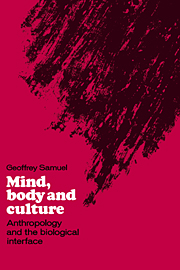Book contents
- Frontmatter
- Contents
- Preface
- 1 New paradigms and modal states
- 2 A natural science of society
- 3 Starting points I
- 4 Starting points II
- 5 Interpreting the flow
- 6 The multimodal framework
- 7 The Ndembu modal state repertoire
- 8 Sociocentric modal states
- 9 Shamanic mechanisms
- 10 The growth of the clerical approach
- 11 Technical and transformational mechanisms
- 12 Mind, body and culture
- Notes
- References
- Index
5 - Interpreting the flow
Published online by Cambridge University Press: 04 September 2009
- Frontmatter
- Contents
- Preface
- 1 New paradigms and modal states
- 2 A natural science of society
- 3 Starting points I
- 4 Starting points II
- 5 Interpreting the flow
- 6 The multimodal framework
- 7 The Ndembu modal state repertoire
- 8 Sociocentric modal states
- 9 Shamanic mechanisms
- 10 The growth of the clerical approach
- 11 Technical and transformational mechanisms
- 12 Mind, body and culture
- Notes
- References
- Index
Summary
We have arrived at a point where we can consider the central concept of the MMF, the ‘modal state’, in rather more detail. In chapter 3 we have considered how different theoretical frameworks (Geertz's and Bloch's) placed different structures upon the generalized ‘flow of relatedness’ introduced in chapter 1. We also noted that the ‘modal state’ had some of the features of a scientific paradigm in the Kuhnian sense. It, too, in other words, places a ‘structure’ on the ‘flow of relatedness’. In the present chapter we shall examine some of the implications of a concept such as the ‘modal state’. What does it mean to say that the ‘modal states’ structure the ‘flow of relatedness’?
Modal states at the individual level
This issue is initially simplest to approach in terms of the operation of the modal state at the level of the individual (the MSi). At the individual level, the state's ‘structuring’ action functions so as to provide a structuring of experience for the individual who is operating in that state. The question of the structuring of experience has been explored in considerable detail by the anthropologist Gregory Bateson and some of his associates, and I now turn to look at some ideas from their work. This will also provide an opportunity to clarify where the MMF stands in relation to some other relevant ideas, such as the Freudian unconscious.
- Type
- Chapter
- Information
- Mind, Body and CultureAnthropology and the Biological Interface, pp. 56 - 66Publisher: Cambridge University PressPrint publication year: 1990



